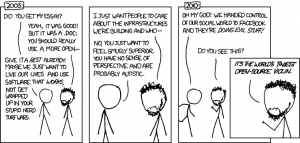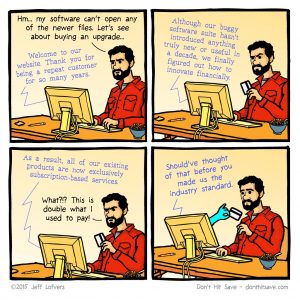When was the last time you used a landline?
We’ve moved gradually to cellphone and non-phone communication networks over the past few decades. Our old copper-line infrastructure sits largely unused, and now companies like Verizon are moving to scoop up this valuable and unused copper while forcing users onto a fiber network. My parents upstate finally made the switch a few years ago, as their old landline (one of few numbers I remember) only received calls from telemarketers. Since then, however there have been several storms which wipe out their power. After such a storm, their phone’s charge percentage serve as a countdown to total isolation.
It’s not just that “new isn’t always better”, but that the new can make the old worse. The Network Effect is a catch-22 which makes a service valuable only once a significant number of people use it. The inverse, the “No Network Effect” means that even if you don’t like cell phones or emails or whatnot, you WILL upgrade or be removed from society.

xkcd 743 from 2010(!)
This concept is an important addition to the readings, particularly when we think of questions of consent. We may know about algorithm bias, digital redlining, and disparities in how infrastructure services the privileged v the vulnerable. The current platforms are unethical, but what good does knowing do us as individuals? Even if we don’t wish to consent to the current network, it is arranged so that the alternative is being rejected by society.
The questions I tend to focus on in terms of digital pedagogy are (1) how do we build/adopt inherently ethical networks (e.g. FLOSS)? And (2) how do we divest from or break unethical networks? Any educator plays an important role tools and platforms for their students, and these choices are inherently political. Teaching photoshop over GIMP; using SPSS over R; or accepting ‘.docx’ over ‘.odt’, are all choices which reduce or promote our students digital rights. How do we also balance this influence with what the Network Effects of industry standards?

A new question that came up for me this week was, to what extent are we also responsible to address these issues as they pertain to our students out-of-class lives? It’s one thing to not use facebook for class discussions, but our students are still on the platforms which don’t respect consent. (Platforms such as facebook go through great lengths just to avoid basic protections)
While this discussion is not at all relevant to most of our fields, should we dedicate some class time to it regardless? Similar to questions of litteracy, the curriculum fails to address these concerns anywhere along k-PhD.
I suspect I will in the future, if for no other reason than to justify why I am asking for “.odt” files. I’m interested in your feedback on what feels useful and what you imagine students would stick to, so I’ve prepared an example of a mini-cryptoparty-worksheet I might present to future students (in addition to discussing the issues above).
Have fun 🙂
Cryptoparty Worksheet
Even if you don’t care about your data, you should care about your shadow! Watch:
Data detox basics:
- Go through settings! The defaults are always worse than they need to be.
- Install these browser extensions: HTTPS everywhere, Privacy Badger, Terms of Service; Didn’t read, and uBlock Origin (Firefox/Chrome)[not the other adblockers out there!]
- Avoid using your phone! Computers give you much more control.
- Keep detoxing here: https://datadetox.myshadow.org/detox
Before using any tool or service, ask yourself:
- Is it free and open source, or is it proprietary?
- What do you know about the company which owns the service?
- What are the terms of service?
“Lost in the small print” Helps make things more readable- Has the tool been security audited?
- Who carried out the security audit?
- Don’t like the answers? Find alternatives!
https://prism-break.org/en/
https://alternativeto.net/

